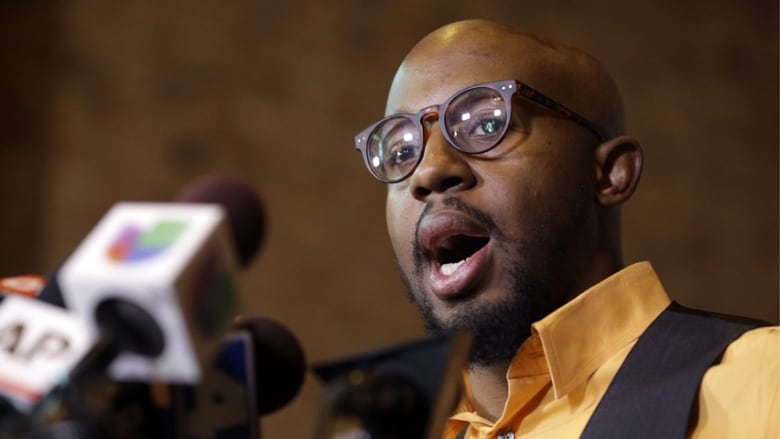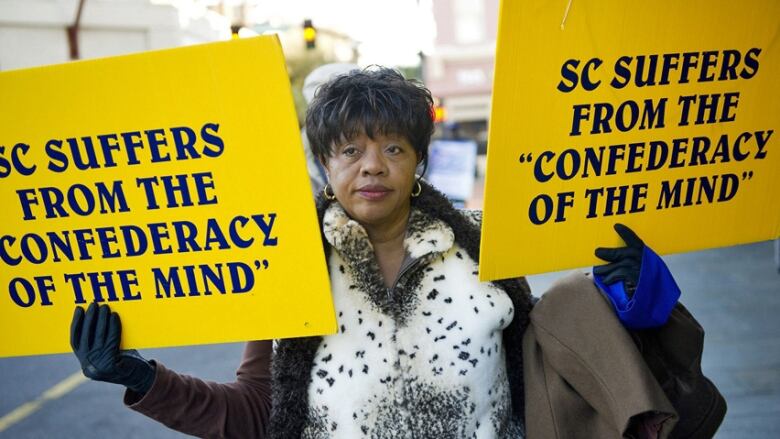Walter Scott shooting: 5 civil rights voices on what needs to change
WARNING: This story contains a graphic video

The white officer who fatally shot an unarmed black man in North Charleston has been "terminated" from the force, the city's mayor said Tuesday, before drawing tepid applause for announcing an order of 150 police body cameras in an attempt to prevent similar incidents from happening again.
As an answer to the outcry over the death of 50-year-old Walter Scott, however, the developments left protesters wanting.
"The mayor's got to go!" demonstrators outside city hall chanted in the South Carolina municipality where officer Michael Slager was captured on video firing eight rounds at Scott's back.
- Man who recorded Walter Scott shooting video called 'hero' by family
- Walter Scott shooting: Police officer faces murder charge in death of black man
- Walter Scott shooting: South Carolina officer fired, charged with murder
Slager has been charged with murder in a case that critics compared to the recent police-related deaths of black men in the U.S. including Michael Brown, John Crawford and Eric Garner.
CBC News asked several American civil rights activists and scholars about what they believe is needed to change how the justice system treats black citizens:
Pastor Carlton Lee, the Flood Christian Church in Ferguson, Ill.:

We can order body cameras all day long. The problem is that we need officers to be accountable when they use them, so they're not allowed to turn off those body cameras at any given moment.
I'm grateful the charges were filed against this officer, but unfortunately I think we need to see more than that. There are people who will never see their husband, father, friend, cousin, uncle alive again because an officer decided to take matters into his own hands.
My prayer will be that they're not only charges, but that there will be a conviction.
- Riot-torn Ferguson's distrust of police flows from a city run on fines
- Ferguson voters elect two more black councillors
Voting is a step in the right direction. That's not just in Ferguson, it's everywhere. We see so often in small municipalities, small counties, where the legislation is not made up of people from that community, so they don't really have a vested interest in the population of that community.
We still have a lot more steps and miles to go before we can experience true equality.
Dot Scott, President of NAACP in Charleston, South Carolina:

The Justice Department needs to come and do some investigation. This is not the first time this has happened. I've been complaining about it for the last five to seven years. The Justice Department needs to look at the numbers of deaths when you make a citizen stop, and the checks and balances to make sure officers are following procedures.
We have to look at it as not only do we have a problem with the racial part of it, we have a problem within the police department policing themselves. If that video had not surfaced, the results of that investigation could have been very different.
Every time an officer is exonerated, or if there's some kind of cover-up of a decision made favourable to the officer even when they're wrong, that sends a message that emboldens them.
I see that North Charleston is due for a change. We have a diverse council, but we're very polite when it comes to anything about race.
Nobody wants to talk about it. It's always, 'I hope we don't make this a race thing.' Well you don't make it about race, it is what it is. It's not imaginary, it's real.
Peniel Joseph, professor specializing in history, race, civil rights and black power at Tufts University:

I don't think the body cameras go far enough. The president gave out money for body cameras in December as well for the Department of Justice.
Federal, state-wide and local, you would need re-training. You need civilian review control.
Part of the overall reason these incidents keeps happening is because the criminal justice system is just the tip of the spear of institutional structural racism in the United States.
The criminal justice has been a source of control and punishment and not a source of justice and protection for especially poor African-Americans and Latino men and women. They're attacked through a focus on incarcerating over most of the last 30 years on drug offences, both felony and non-felony.
Political power and political voice is very important. This is just sort of a visible manifestation of something that's a very deep problem.
It's connected to racial segregation in North Charleston, which is 47 per cent black, and where 80 per cent of officers are white. It's connected to public school segregation there, it's connected to poverty, and the criminal justice system as a race-making institution.
Barbara Arnwine, president of the Lawyers' Committee for Civil Rights:

We need a radical restructuring of policing in America, and part of that starts with changing the culture of policing, where police think that one of their roles is to control — not protect and serve — African-American and Latino populations.
When you're approaching the community as a community you view as hostile, as foreign, as criminal, through a stereotypical lens, then you're going to treat that community accordingly.
So you see this pattern of excessive force, threats, oppressive presence and this kind of mentality that all blacks are criminals.
The community has to organize itself to hold its officials accountable. If there's nobody at the city council asking questions about police accountability, if there's nobody who is making sure the police force is doing their job appropriately, if these issues aren't raised, then you're going to have misconduct by officers who are so inclined.
This desperate need for radical police restructuring is the only way we're going to protect and save black lives.
Alvertis Simmons, Denver civil-rights activist:

I think what needs to happen is two of these cops have got to get indicted. I know the folks in Carolina appreciate the fact this guy was charged, but he hasn't been indicted.
Some cop's got to get indicted and then let a jury of their peers decide, just like what happens in the American justice system for blacks. It needs to happen for police officers. And then you got to go in the community and build trust.
It will show America that we are fair to black people, we understand that they're not just slaves anymore, they're real people that pay real taxes, that have real families, and we've got to treat them accordingly.
I keep telling people in Denver, you've got to level the playing field, give black people some jobs, some contracts, some opportunities, and then you'll see some difference. I'm out on the streets every day. I talk to people. They don't want to sell dope. But ain't no man going to sit back and let his family starve.
— Interviews were edited for length